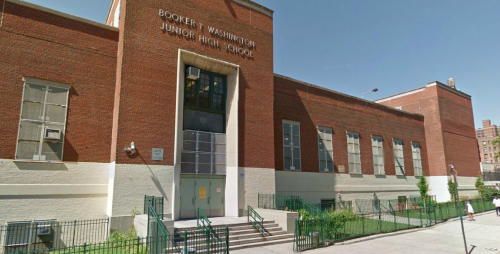
By Julia Stern
At a District 3 Community Education Committee (CEC3) meeting earlier this month on Zoom, representatives from the Department of Education (DOE) described plans to expand sibling priority in middle school admissions in order to keep families together.
Present at the meeting were Superintendent Christine Loughlin, Chief Enrollment Officer Sarah Kleinhandler, Executive Director Amy Basile, and Senior Director of Middle School Admissions Matthew Broggini.
Mr. Broggini explained that before this new expansion, only applicants who were siblings of current sixth-graders would receive sibling priority. Now, at schools where the final year is eighth grade, the DOE has expanded priority to middle school applicants with siblings in sixth or seventh grade.
For schools that continue through twelfth grade, middle school applicants with siblings in grades six through eleventh now have priority.
Priority applies to full siblings, half-siblings, step-siblings and foster siblings residing in the same household as the applicant.
The new policy covers the current admissions cycle for the 2022-2023 school year.
During the Q&A portion of a meeting, one parent asked, “Are there insights about how prioritizing keeping middle school siblings together affects diversity and equity?”
Mr. Broggini said that exact data was not currently available, but eliminating screening criteria and relying on the lottery system has made schools better reflect the diversity of the district. He affirmed that the DOE remains committed to equitable practices, but did not provide data about whether sibling priority expansions would limit diversity.
Another parent worried that the new sibling-priority expansion would disadvantage children without siblings, and jokingly asked to create a support group for her only child navigating the admissions process. This parent also expressed frustration about the policy changing after applications for middle schools closed, as they were not aware of the new expansion during the application process.
The meeting ended with another parent describing how demoralizing this year of middle school admissions was. “It feels like The Hunger Games,” she said.









The parent of an only child who was frustrated that this happened after the process closed clearly does not understand the process. You list the schools in your order of priority. They pull the names from the lottery. When they pull your name, they go down your list and place your child at the first available school on your list.
There is no way to game the system and there is nothing to do other than just list the schools in your order of preference. So this has absolutely no impact from that perspective.
Carlos,
What you have described doesn’t mention siblings at all. How does the new sibling priority come into play?
The sibling policy likely slightly decreases the odds of getting into some of the more desirable schools.
However, when making your list, the odds of getting into a school should not matter. You should still list them in your order of preference, as once they pull your number, they just go down your list.
So knowing that your odds have changed slightly makes absolutely no difference when making your list. As much as I have issues with the new process, it is incredibly straight-forward and people are over-complicating it.
Can you explain, or give me a link, that explains how it works? If it is still a lottery when a child’s name is drawn the school his sibling attends either has open spots or it doesn’t. So sibling priority can’t work within that system. OTOH, if they do the lottey first for siblings and fill many seats in desirable schools before first born and only children have their lottery, that would seem to be a big decrease in the odds of getting in.
I have looked on the DOE site and they just say “sibling priority is expanding to middle schools” without an explanation that I can find.
Brandon:
There are two issues here:
1. I raised the question of how this impacts parents of only children in the process of completing their list. As I explained above, it should have zero impact. They should make their list based solely on their order of preference, and the odds of getting into the school should not factor into that ordering.
2. As far as the question you raised about how the mechanics work for parents of siblings, I don’t know and that is a good question. In their case, how they order things might make a difference. I can make some educated guesses but don’t want to muddy things further. Hopefully there will be clear instructions. The DOE also should not just assume that all siblings want to attend the same school – I’m guessing most do, but there are plenty who do not so that optionality should be included.
I agree. In my experience the number of children in a family is not a significant factor. What is problematic is the instinctive response some adults have to blame a sibling for the possibility that their child might not get into their desired school. Not like this is new, but this impulse is really offensive. Adults are in charge of the DOE (or at least we like to think they are adults), so to blame children for their actions is pathetic in my opinion.
This has almost no impact on equity. I wish people would stop obsessing over “equity” and instead obsess over bringing the weaker schools up to the level of the stronger schools (rather than bringing the stronger schools down to the level of the weaker schools).
The revised middle school process has just created more confusion. The populations of the schools haven’t changed very much, except there are now more misplaced kids either because the parents didn’t understand the process or they got shut out of their top choice. And it is ridiculous how late decisions come out – this should be resolved by February or March – it’s not that hard.
Can the first child join that suggested support group for only children? For the purposes of this policy they are treated the same as an only child.
And did the parent who suggested that group ever consider what it’s like to take two or three kids to two or three different schools? Those are the families that could use some support.
Though I won’t benefit from it, I am supportive of the sibling policy. That being said, I get really annoyed by people with multiple kids (especially those with three or more) who complain about how hard it is. No one forced them to have multiple kids.
Apologies if my agreeing with the policy with a touch of sarcasm, was read as a complaint about having more than one child. And yes by middle school kids can travel by themselves, I should have used the word “attend” not “take” to mean the entire experience of supporting 2-3 schools, attending functions, fund raisers, etc and being involved parents in making the school a community. This new policy seems wise from that perspective.
Don’t kids travel to middle school without parents?